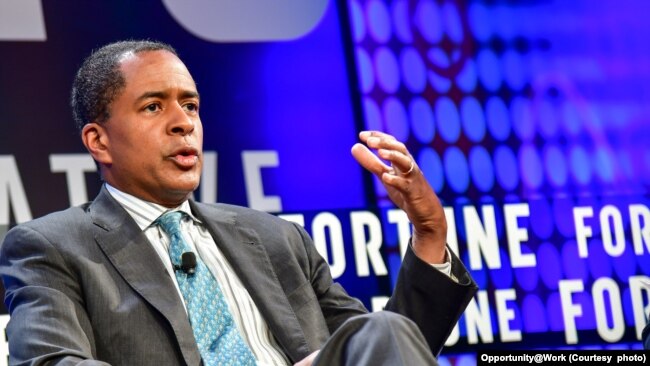Should American Companies Stop Requiring College Degrees?

In 1988, the percentage of U.S. adults age 25 or older with a college degree reached 20 percent for the first time. That information comes from the National Center for Education Statistics.
Many people consider a degree from a four-year college to be an important step toward a good job. Employers have used the credential to help choose between job candidates.
Experts who study labor and higher education have said a college degree tells businesses that their employees have basic work skills.
But, by 2019, the number of adults with college degrees increased to 36 percent. That is a rise of 80 percent over 30 years. A 2019 story in the Wall Street Journal newspaper called this increase “degree inflation.” That meant the credential had become less valuable because it was so common. However, many businesses still use a college degree as a filter in choosing possible workers.
While more American workers have a college degree than in the 1980s, there are still millions of experienced workers who do not have one. People who study labor say dependence on a college degree creates a needless barrier.
Byron Auguste is one of them. Auguste is an economist and a labor expert. He was an adviser to former President Barack Obama. In 2015, he helped start a company called Opportunity@Work. It aims to help skilled workers in the U.S., who do not have college degrees, find good jobs.

Auguste tells the story of his father, who took computer classes. His father then went on to have a successful computer programming career. But he did not have a college degree.
Auguste calls workers like his father STARS. It stands for “skilled through alternative routes.” That means they use different paths to get the skills and knowledge they need to do a job. His company’s research shows the three main groups of STARS are: African-Americans, Hispanics and rural people.
Auguste recently wrote an opinion piece for the Washington Post newspaper. He later spoke about his work in a podcast.
He said the college degree filter creates a “skills gap.” The lack of a degree makes employers think there are not enough workers to do some jobs. But in fact, there are workers with the needed skills.
“Most of the skills we use at work we learn on the job, not in school. So if we stop people from having that experience on the job, well, then, obviously, we're going to work our way into a skills gap, and I think that's exactly what we've done.”
Some jobs clearly require special degrees and training such as the professions of medicine or law.
However, there are millions of good workers in the U.S. who have valuable experience, said Cristian Sirera. He works with Auguste at Opportunity@Work. Sirera said they may have jobs at large stores like Walmart and could move into better jobs with a little special training. Sirera said many of these people speak English and another language.
He gave an example of someone who needs to work with people who can speak both English and Spanish. He said an immigrant has skills people cannot learn in college.
“Like patience and not taking things too personally and having a little bit of humor about life in general as you’re learning about a different culture, a different country, a different everything.”
A company, he said, that is flexible in its hiring methods can identify a good worker and then train them for a better job.
Auguste recently spoke with the New York Times newspaper. He said people need dependable jobs to enter the middle class. If companies continue four-year degree requirements, millions of people will not be able to get better jobs.
Sirera moved to the U.S. from Spain without a college degree. He found that if he wanted to have a good job, he would need to find a way to finish college. He did that, but it was not easy. He started by attending a community college.
Many people will still need to push themselves to get a college degree, he said. However, companies like Opportunity@Work are asking businesses to reconsider their job requirements. A recent story by the Harvard Business Review noted that during the COVID-19 health crisis some companies removed a college degree from their list of job requirements.

Before that, a 2018 story by CNBC noted that companies including Google, Apple, IBM and Starbucks were removing college degree requirements from some job listings.
Sirera said many of those jobs are “show your work” jobs, like writing programming for computers. But he said there are still other jobs where people who have work experience without a degree can succeed.
Also, he said, companies need to tell their employees about opportunities for them to get better jobs, and to make it easier for good workers to be considered for them.
Sirera called on employers to offer jobs with mid-level pay and good job possibilities to STARS. He said that STARS answer when employers send a strong signal that they need workers with skills and do not require a college degree.
“But as of right now, employers are failing to turn the signal on and commit to action.”
That, he added, prevents STARS from taking action and keeps them “on the sidelines.”
___________________________________________________________________
Words in This Story
college degree (bachelor’s degree) –n. a degree that is given to a student by a college or university usually after four years of study
credential – n. a document which shows that a person is qualified to do a job
filter – n. a way to limit the number of candidates for a job or position
career – n. a job or profession that someone does for a long time
obviously – adv. in a way that is easily seen or understood
patience – n. able to remain calm and not become bothered when waiting for a long time or when dealing with problems or difficult people
on the sidelines – idiom not taking part in something, being outside of where the action is taking place